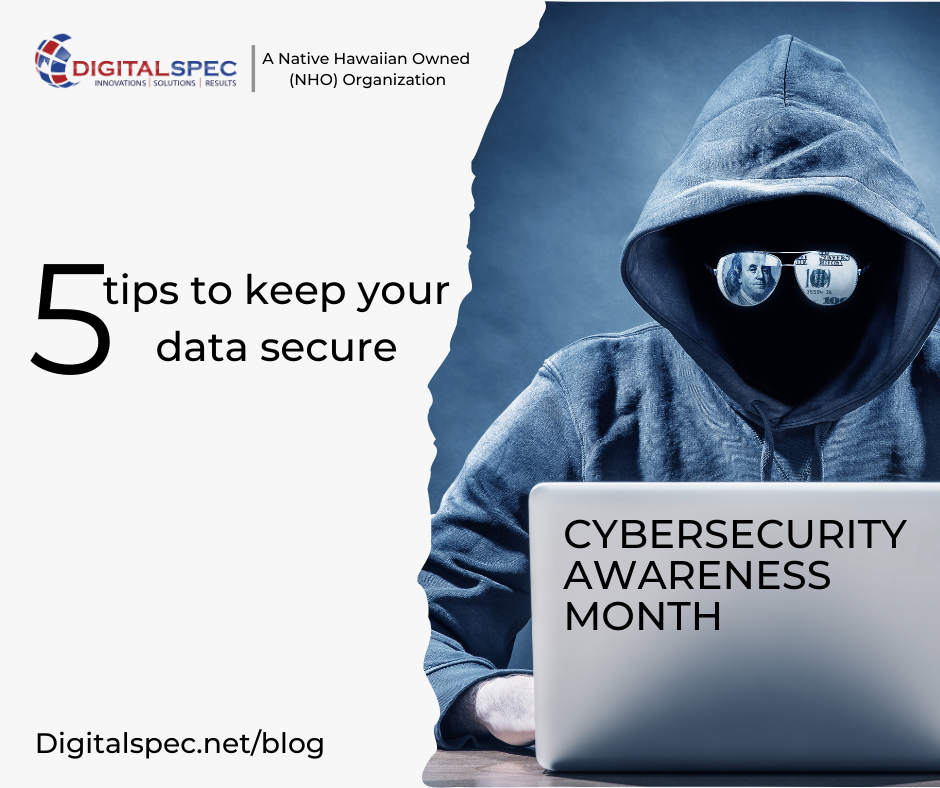Cybersecurity awareness month is an important time to realize and appreciate that we live in a predominantly digital world. At this point, most of our businesses, and our lives for that matter, live in the cloud. And while companies like AWS and LastPass spend billions of dollars securing their systems to prevent data breaches, the fact is that no-one is completely immune from the ever increasing threat of cyberattacks. And despite what these companies are already doing, there are always individual steps we and our businesses can take to minimize the odds of falling to prey to hackers and cyberbullies. Therefore, as we come close to the end of another tumultuous year where cyberattacks cost businesses over $6.9B in damages (not to mention tattered reputations), cybersecurity awareness month offers an opportunity to remind ourselves of the steps we can take to protect our online information.
Here are some simple actions you can take to ensure that your business does not become one of the 30,000 others that are hacked everyday in 2022.
1. Create a strong password policy.
One of the most important things you can do to protect your business from cyberattacks is to create a strong password policy. This policy should require employees to use strong passwords that are at least eight characters long and include a mix of letters, numbers, and special characters. Employees should also be required to change their passwords every 90 days.
2. Educate employees about phishing scams.
Phishing scams are one of the most common ways that hackers try to gain access to business systems. These scams typically involve an email that appears to be from a trusted source, such as a financial institution or well-known company. The email will often contain a link or attachment that, when clicked, will install malware on the employee’s computer. In fact, using emails to deliver cyber viruses is so common that, in 2022, they were for 94% of all malware attacks.
Educating your employees about how to spot phishing emails can help them avoid falling victim to these scams.
3. Implement two-factor authentication.
We know it’s a pain — but trust us when we say it’s an essential one. Two-factor authentication (2FA) adds an extra layer of security to business systems by requiring employees to use two different methods to log in. For example, an employee might be required to enter their username and password as well as a code that is sent to their mobile device via text message. 2FA makes it more difficult for hackers to gain access to business systems since they would need both the username and password as well as physical access to the employee’s mobile device in order to log in.
4. Keep Your Software Up-to-Date
One of the simplest but most effective things you can do to improve your cybersecurity is to keep your software up-to-date. Software updates often include security patches that can help protect your system against the latest threats. So, whether it’s your operating system, browser, or other applications, such as WordPress, CRM, mobile app, etc., make sure you’re regularly applying updates as they become available.
5. Invest in Cybersecurity Insurance
Finally, it’s important to note that, even if you take all the necessary precautions, there’s still a chance your business could fall victim to a cyberattack. That’s why it’s important to have cybersecurity insurance in place to help cover any expenses associated with recovering from an attack, such as data breaches, loss of business income, theft of intellectual property, and damage to your reputation. When shopping for insurance, make sure you understand what type of coverage is included and what’s excluded so you can make an informed decision about what’s right for your business. Here’s a helpful resource for finding the best cybersecurity insurance for you.
As a business owner, it’s important to be aware of the potential risks posed by cyberattacks and take steps to protect yourself. By keeping your software up-to-date, using strong passwords and MFA, being wary of phishing emails, and investing in cybersecurity insurance, you can help reduce your risk of becoming a victim of cybercrime. May Cyber-force be with you!



